On 27 February, the National Assembly of South Africa passed a motion on land expropriation, tabled by the Economic Freedom Fighters and supported by the majority of parties in parliament, including the ANC. The motion was passed by 241 against 83 and called for a process to review the constitution and possibly change it to allow for land expropriation without compensation. Parliament’s Constitution Review Committee will conduct “public hearings” to illicit “public comment” and report back to parliament in August. If a constitutional amendment is recommended, it requires the support of two-thirds of members of the National Assembly as well as the support of 6 of the 9 provinces. Even then, the last word would be from the Constitutional Court, which is the highest decision-making body as far as constitutional legality is concerned.
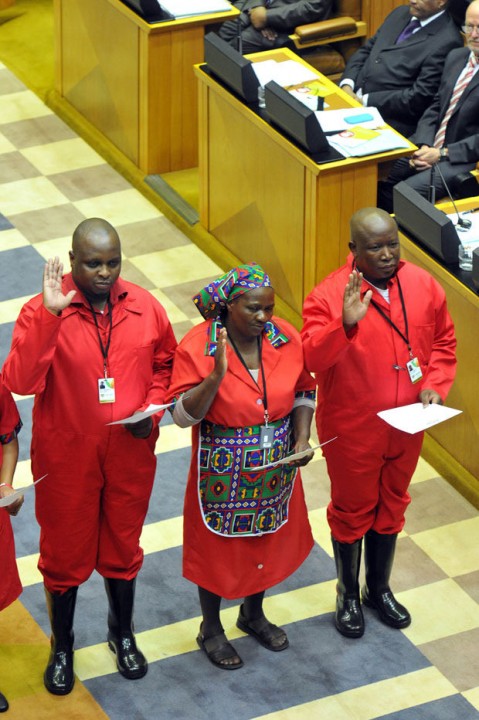 The EFF’s motion called for constitutional changes to potentially permit uncompensated land expropriation / Image: Flickr, GovernmentZA
The EFF’s motion called for constitutional changes to potentially permit uncompensated land expropriation / Image: Flickr, GovernmentZA
At the moment there is no programme of land expropriation without compensation in South Africa. The only thing that exists is this parliamentary motion. As a leading ANC member stated, at this stage land expropriation without compensation “remains a slogan.” But the fact that such a motion was adopted is a consequence of the pressures from below that have been building up over the last two decades. It comes in the wake of a massive upsurge in the class struggle over the previous period. To some degree this is now being used by the more far-sighted section of the ruling class to to manage the situation from above to prevent it from spiralling out of their control.
To this day, the government’s land restitution process, based on the ‘willing buyer, willing seller’ principle, has only transferred a paltry eight percent of commercial farm land to its original black owners. In 1994 the government set a target of 30 percent to be achieved by 1999! This leaves 72 percent of the land in white hands, who account for only 10 percent of the population. In the context of the class struggle in South Africa, the slow pace of land reform and land restitution is a ticking time-bomb. The fact that the government has failed to reach even this low target shows that thoroughgoing land reform in the current conditions cannot be achieved on a capitalist basis.
Currently the constitution does allow for expropriation but stipulates that compensation should be paid on a “just and equitable” basis. The meaning of this has never been explained and has never been tested in a court. This is because the ANC government has bent over backwards to accommodate landowners by using the ‘willing buyer, willing seller’ principle, which is based on the market value of the land. This is an even more market-friendly policy than the constitution requires. In other words, expropriation under the current constitutional provisions is permissible but the ANC has generally failed to use it. This is the main reason for the slow pace of land reform and has led to a buildup of frustration over the past 25 years. Secondary factors for the slow process are the bureaucracy and corruption created by the cumbersome Land Restitution Act.
Hysteria
However, the adoption of this motion by the National Assembly has opened up one of the biggest political debates in South Africa in the past 25 years. At bottom the response to the motion clearly reveals a class divide. On the one hand, it elicited a furious response of hysteria, slanders, fear-mongering and outrage from sections of the propertied classes, such as the big white farmer lobby groups. On the other, it created a sense of expectation, especially from the rural poor. This is dangerous stuff for the ruling class. They are not so much concerned about the intentions of the parties in parliament, which they are able to control. What they are really concerned about is that the debate will conjure up uncontrollable forces from below.
This is the reason for the open panic around this issue. In the days following the adoption of the motion, sections of the capitalist media embarked on a hysterical campaign, unrivalled in recent memory. Every day the newspapers warn of impending doom and economic catastrophe.
The ruling class’ chorus of doom has been joined by sections of their international colleagues. The Daily Mail screamed: “White South African farmers to be removed from their land after parliament vote.” This is a lie: the motion does not say that. But why let the facts stand in the way of a good story?
The Democratic Alliance, the main bourgeois party, ran a hysterical SMS/text campaign saying that the ANC and the EFF are “working together” to take away private homes. Afriforum, a right-wing Afrikaner lobby group, is petitioning the United Nations and the “international community”, i.e., the imperialist powers. More than 12,000 people have signed a petition asking Donald Trump to let white people in South Africa emigrate to the United States on an emergency basis.
Another petition, aimed at European Union President Jean-Claude Juncker, German Chancellor Angela Merkel and British Prime Minister Theresa May, has nearly 17,000 signatures. Janice Atkinson‚ a former member of UKIP and now a British member of the European Parliament, wrote to British Foreign Secretary Boris Johnson‚ asking him to intervene.
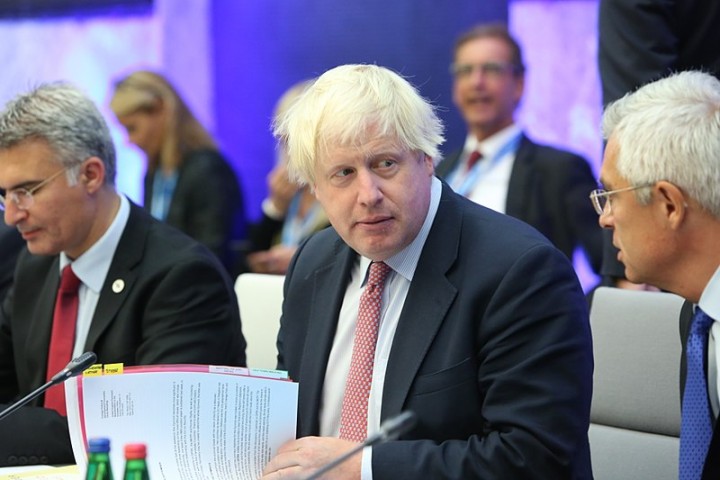 The EFF’s motion has provoked hysteria from the ruling class internationally / Image: EU2017EE Estonian Presidency
The EFF’s motion has provoked hysteria from the ruling class internationally / Image: EU2017EE Estonian Presidency
There are petitions about genocide of whites in South Africa committed by “communist terrorists.” Australian Home Affairs Minister Peter Dutton said that the country is considering fast-tracking visas for white South African farmers. This is the same government which conducts sea blockades to prevent “boat people” and refugees from reaching Australia. And of course, apocalyptic comparisons were drawn with Zimbabwe-style ‘land grabs’ despite the fact that the situation is not comparable at all.
The fact that this is a very mild motion, calling for a debate and “public comment”, is of little consequence to these people. For them, merely talking about touching private property should be avoided like the devil avoids holy water. The suggestion of making even mild amendments to section 25 of the constitution, the holy “property clause” which is the basis of capitalist relations in South Africa, was bound to elicit such a response.
Hypocrisy
Of course, this is hypocrisy of the highest order. Land expropriation without compensation is nothing new in South Africa. The indigenous black people have been brutally expropriated and robbed of their land through wars of dispossession and conquest for hundreds of years.
This robbery was then legalised by passing a whole series of acts of land dispossession during the colonial period and the apartheid era, including The Glen Grey act of 1894, The Native Land Act of 1913, The Transvaal Asiatic Land Tenure Act of 1930, The Riotous Assemblies Act of 1930, The Asiatic Immigration Amendment Act of 1931, The Native Trust and Land Act of 1936, The Slums Act of 1934, The Rural Dealers Licensing Act of 1935, The Representation of Blacks Act of 1936,The Native Laws Amendment Act of 1937, The Pegging Act of 1946,The Group areas act of 1950…The list goes on! The crown in the jewel is the negotiated settlement at Codesa in the 1990s which enshrined “property rights” – that is to say the rights of the ruling class – into the constitution of the country.
This process of dispossession has been happening uninterruptedly for the past 400 years. There were no outcries about compensation at any time during this period. But now that there are suggestions of directing this process in the opposite direction to redress this crime, there is an unparalleled outpouring of hysteria and doomsday prophecies. But expropriation of the oppressed is not only a historical process. It is happening to this very day under the constitution, which protects this state of affairs. For the overwhelming majority of working-class people there is no such thing as ‘security of tenure’ or ‘property rights’, for the simple reason that they are denied of property under capitalism.
Smoke and mirrors
The immediate reason why the motion was passed in the National Assembly can be traced to the factional fighting inside the ANC over the last period. This eventually played itself out at the party’s 54th conference in December 2017. Up to that point the ANC repeatedly opposed all the parliamentary motions on land expropriation tabled by the EFF. But at the December conference there was a battle between the factions over the term “radical economic transformation”. This is an empty sack, which could be filled with any meaning. In an effort to undermine the Ramaphosa faction, sound more ‘radical’ and rally his base in the more rural provinces to support his faction at the conference, Zuma demagogically pushed for policies such as ‘free’ higher education, which is to be introduced this year. As we saw at the budget presentation this is now not ‘free’ at all because the government is paying for it by taxing the poor.
 Jacob Zuma’s faction of the ANC has attempted to undermine the Ramaphosa faction by appearing more ‘radical’ / Image: WEFA
Jacob Zuma’s faction of the ANC has attempted to undermine the Ramaphosa faction by appearing more ‘radical’ / Image: WEFA
It is a similar situation with the land question. In order to undermine Ramaphosa by demagogically appealing to the poor rural population, the Zuma faction pushed for the ‘radical’ resolution on land expropriation without compensation. The aim was not so much to resolve the land issue, but to win total control of the ANC. After all, it was the same Zuma faction that had failed to carry out previous conference resolutions. A clear example of this is the 2012 Mangaung resolution, which called for the creation of a state bank. It is the same ANC government that has failed to expropriate land and resolve the issue for the last 25 years, despite consistently having more than 60 percent of the vote in parliament.
Crisis management
The introduction of this motion at the December conference was strongly opposed by the Ramaphosa faction. There was a furious and rowdy debate which escalated into a physical altercation. This nearly led to the collapse of the conference on the last day. The Ramaphosa faction, in a bid to prevent a collapse of the conference and avoid a split, bargained successfully to adopt the resolution with two important caveats – that food security and economic stability were guaranteed. These caveats are so broad that they could effectively prevent any attempt at meaningful and substantial land reform.
At that point the ANC would have been satisfied to leave matters as they were. It would have been yet another conference resolution, which could have been pushed into the background to gather dust. Over time many people would have forgotten about it. The problem for them was that the EFF took them at their word by tabling the motion in the National Assembly. This effectively put them on the spot. They could not possibly have opposed the motion and thereby oppose a resolution of their own conference without plunging the party into deeper turmoil. They have effectively been dragged to this point kicking and screaming and since then they have had to carefully manage the situation and perform damage control.
Damage control
In addition to the two caveats introduced by the ANC, its parliamentary caucus made seven substantial amendments to the EFF’s motion before it was adopted by the National Assembly. The cumulative effect was to water down the original motion substantially. The clearest example of this is clause six, in which the original motion as tabled by the EFF:
“…recognises that at the centre of the present crisis regarding the resolution of the land question is section 25 of the Constitution, the ‘property clause’, which protects private property rights, and requires the State to pay compensation when expropriating land in the public interest and for a public purpose“
The ANC’s amendment says:
“…recognises that the current policy instruments, including the willing buyer willing seller policy, and other provisions of section 25 of the Constitution may be hindering effective land reform.”
Here the EFF explicitly blamed the property clause and the requirement to pay compensation for expropriation as to the central obstacle to land reform. The EFF’s original proposal was for nationalisation of all land. The ANC’s amendment does not explicitly blame the property clause but specifically the willing buyer, willing seller principle and other unnamed provisions of section 25 of the constitution. In the debate the ANC also proposed that expropriation without compensation is only one of the methods that could be used, with which the EFF disagrees. There is therefore a fundamental difference between the original motion and the one adopted. In effect, the EFF conceded to watering down the motion significantly to get ANC support.
Under the amendments and new proposals a framework of property rights would continue to exist. In other words private property will continue but with new conditions which will be specified during the work of the Constitution Review Committee. Also, it is important to note that section 25 of the constitution does not allow for unlimited and wholesale expropriation. In other words, it allows for expropriation on an individual and case-by-case basis only.
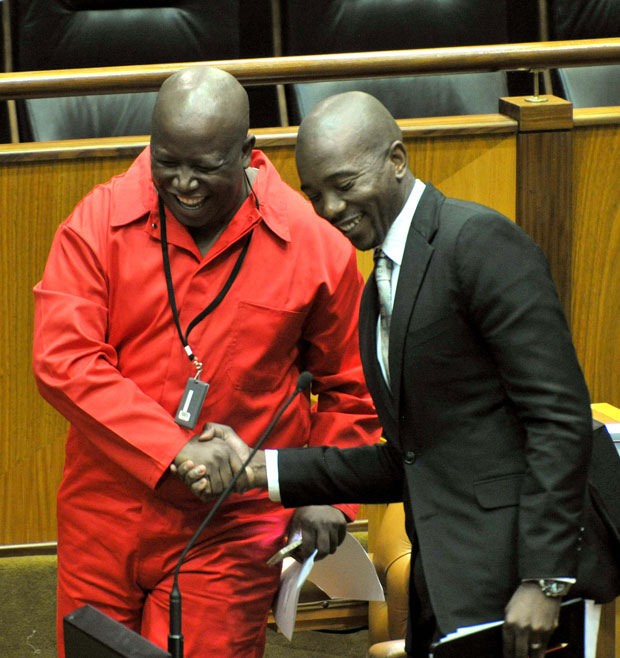 The EFF allowed their motion to be watered down to get ANC support / Image: Flickr, GovernmentZA
The EFF allowed their motion to be watered down to get ANC support / Image: Flickr, GovernmentZA
The most obvious outcome of watering down the motion is that the Constitution Review Committee could recommend the constitution be amended to make explicit provision that, in certain circumstances, the principle of “just and equitable” compensation could be nothing. This would allow for expropriation without compensation in certain instances, and legislation could be passed to give the exact circumstances under which no compensation could apply.
This will cover the ANC’s position that the act of paying no compensation is “among the mechanisms” available for land reform. This will provide them with a legal, bureaucratic and administrative loophole which, in the end, poses no fundamental threat to the system and the property rights of the rich landowner class.
The land question
South Africa has a history of brutal dispossession of the African people, going back hundreds of years. Land has been at the heart of this. The situation escalated dramatically after the Union of South Africa was declared in 1910, which excluded black people from citizenship. The 1913 Natives Land Act stripped black people of land ownership and eventually designated 87 percent of the land for whites. The black majority was designated just 13 percent in the overcrowded ‘native reserves’. This all had a crushing impact on African culture and stripped millions of black people of their dignity and identity. It destroyed the tribal societies, which were based on the land, and created a massive pool of wage-workers, which capitalism required after the discovery of one of the biggest mineral reserves in the world. Black ownership of land was abolished, which brutally cleared the way for capitalist development and the industrialisation of the economy, which picked up dramatically towards the end of World War II.
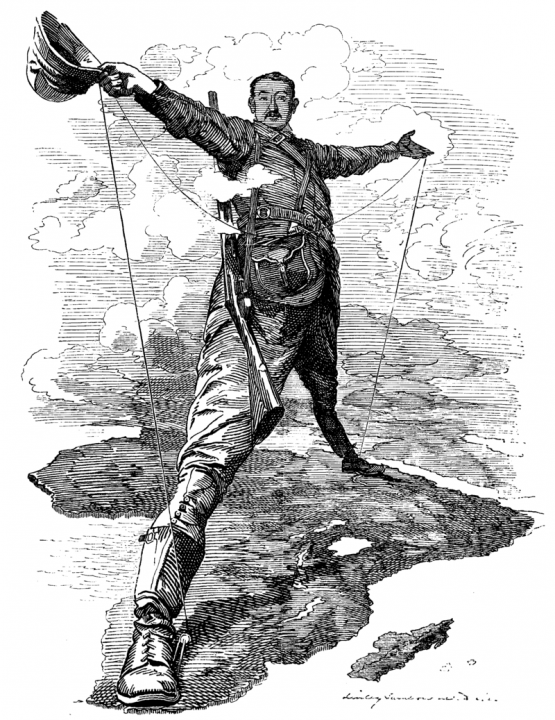 Imperialism stripped black natives in Africa of their lands, identity and dignity / Image: public domain
Imperialism stripped black natives in Africa of their lands, identity and dignity / Image: public domain
The struggle for national liberation thus went hand-in-hand with the ‘return of the land’. But in place of the old tribal societies, the process of capitalist development also birthed a powerful, modern working class, which was the most powerful and consistently revolutionary force in the struggle for national liberation. In the end it was the mass struggles led by the working class that overthrew the Apartheid regime.
Meaningful land reform
However, the formal overthrow of Apartheid brought about a contradictory situation, largely because of the negotiated settlement between the petty-bourgeois leaders of the liberation movement and the Apartheid regime. While white minority rule was overthrown and a bourgeois democratic system established, it left the productive sectors of the economy (including the land) in the hands of the white minority. Now, 25 years later, 72 percent of the land is still in white hands while the black majority in the rural areas are confined to the most barren land. In the big cities the urban poor are still cramped in huge townships and squatter camps on the outskirts. So while the country largely achieved most of its bourgeois-democratic tasks, certain elements of the national question and the need for land reform remain.
In South Africa today there are about 2m black subsistence farmers growing crops and raising livestock primarily for their own use. Additionally, there are about 200,000 black small farmers selling their produce to the agricultural market. In total these 2.2m black farmers are responsible for only five percent of all economic output in the agricultural sector. Compared to this, there are only about 35 000 commercial farmers owning the most fertile land. They are responsible for the remaining 95 percent of agricultural production. Of these, just 1,300 farms receive more than 50 percent of total agricultural income. These are the big capitalist farmers using the latest technology and farming methods to produce for the world market.
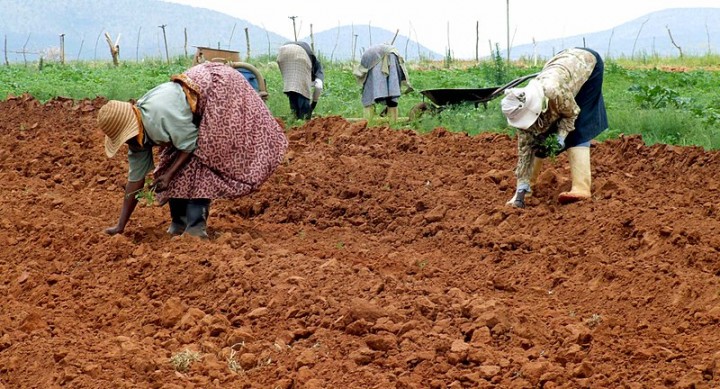 2.2m black farmers are responsible for five percent of economic output in agriculture / Image: Kuzkid
2.2m black farmers are responsible for five percent of economic output in agriculture / Image: Kuzkid
Then there are the giant capitalist agri-businesses. Just three companies control more than 90 percent of maize, sorghum and wheat production and distribution. Two giant companies control the production of fertilizers and three big supermarkets control 70 percent of the food retail sector. These giant enterprises dominate nearly the whole agricultural economy.
Real and meaningful land reform would mean expropriating the 35,000 big capitalist farmers and the giant monopolies which dominate the agriculture sector. But that is not all. These big farms are directly linked to the banks through the agricultural market and mortgages. This is an example of how intertwined the capitalist economy is. Therefore, the expropriation of the giant farming monopolies would immediately lead to a clash with monopolies in other sectors. The expropriation of land would effectively but the question of general capitalist relations on the agenda.
Of course, in such a reform, the land of the small farmers would largely be left untouched. In order to boost agriculture, what is needed is to introduce the collectivisation of agriculture on a voluntary basis by using the most modern technology, (tractors, fertilizers and so on) that already exist on big commercial farms. The large capitalist farms should be nationalised and placed under the control of the farm workers, keeping in place the modern, advanced technologies already available, while the small black farmers should be offered help to modernise their farms with the same technology available to the rich white farmers.
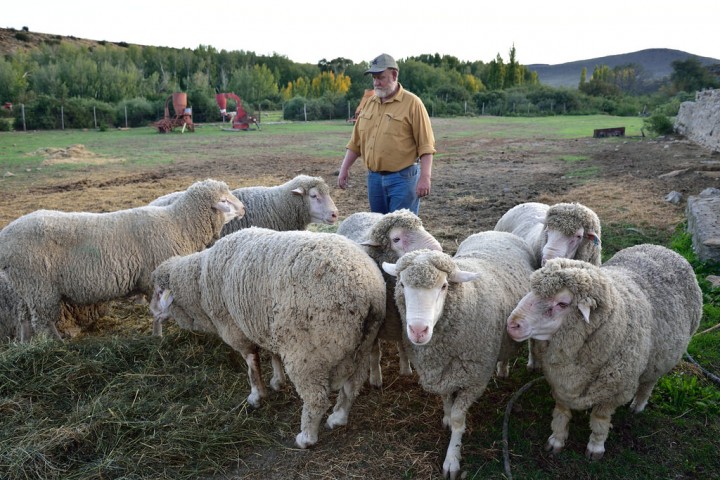 Wealthy, white, commercial farmers own the vast bulk of fertile land in South Africa / Image: Flickr, SATB
Wealthy, white, commercial farmers own the vast bulk of fertile land in South Africa / Image: Flickr, SATB
On the basis of the high level of productive resources and the latest machinery and farming methods, the introduction of collectivisation would revolutionise the whole of agriculture, dramatically increase food production and lift millions of people in the rural areas out of poverty. There are 700,000 rural workers who must be unionionised and brought closer to their working-class brothers and sisters in the cities. In addition, the 2.2m small and subsistence farmers should be won over by giving them the land and introducing the collectivisation of agriculture.
There is therefore no need for wholesale expropriation of the small farmers. What is required is to win them over to a revolutionary programme aimed at the agricultural sector, based on the expropriation of the big farming monopolies that oppress them.
But if there is a need for expropriation, compensation can be paid on the basis of proven need. For Marxists, the issue of compensation is not a matter of principle, but a flexible question. In order to win over the hundreds-of-thousands of small farmers and the 2m subsistence farmers to substantial land reform and isolate the big landowners, it is entirely permissible to offer them compensation for their land. But if non-compensation is made a matter of principle, then this would drive the small farmers and millions of rural poor into the hands of the big commercial farmers. This could form the social basis for a counter-revolution, coming from the rural areas.
Traditional land
Another important aspect is the question of traditional land. During the Apartheid era, the regime created a number of Bantustan and ‘homeland’ areas and elevated traditional leaders like kings and chiefs to privileged positions to police these ‘labour reserves’, and provide the system with cheap, black labour. Many of these traditional leaders supported the Apartheid system and actively collaborated with the regime. After the ‘democratic transition’ of the 1990s, the ANC government kept these traditional patronage systems intact. In fact, they have their own body and receive salaries and allowances from the state. Today some 15 million people still live under these traditional forms of governance.
Traditional leaders, like the current Zulu King, have engaged in a campaign of warmongering around the issue of traditional land which is held in the so-called Ingonyama Trust. This trust was formed by an act of the Apartheid government just days before the first non-racial elections in 1994. This was designed to install a key ally of the old regime into the new dispensation and appease the reactionary Zulu nationalists of the Inkatha Freedom Party to guarantee their participation in the election. The suggestion that the trust be abandoned and the land transferred to the people directly has been met with fierce opposition by Zulu traditional leaders and the king.
 Zulu King opposes giving land to the people / Image: Reinhardth
Zulu King opposes giving land to the people / Image: Reinhardth
These traditional leaders are also under the thumb of big multinational companies, which bribe them to get access to the land for mining and so on. These rural overlords are complicit in the exploitation of the rural people. The interests of this rural elite are therefore linked to capitalism and not to the rural people who live under them. Therefore, meaningful land reform in these areas means expropriating the traditional elite and giving the land to the people. It also means that all salaries, subsidies and allowances from the state must be abolished.
Bureaucratic reforms or revolution from below?
The Zuma wing of the ANC has clearly given Ramaphosa a poisoned chalice. This has now created expectation from sections of the working class and the rural poor. The masses do not necessarily read the text of parliamentary motions. What they do know is that the ANC has supported the EFF’s motion to carry out a more radical land reform. It is this sense of expectation which frightens the ruling class.
For Ramaphosa it is now a matter of pushing through reforms from above to prevent revolution from below. He is desperately trying to reassure the ruling class that the reforms are intended to prevent the wholesale seizure of private property. In this he is supported by the most intelligent sections of the ruling class.
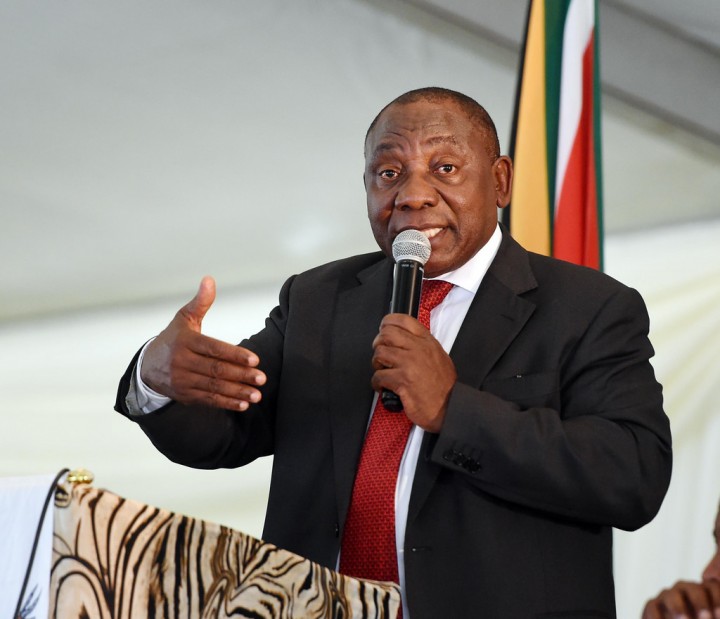 Ramaphosa is pushing through reforms from above to prevent revolution from below / Image: Flickr, GovernmentZA
Ramaphosa is pushing through reforms from above to prevent revolution from below / Image: Flickr, GovernmentZA
Ramaphosa is coming out strongly against any independent moves to seize or occupy land as has happened in five areas in Gauteng province over the last few days. He wants to push through these reforms using the parliamentary system and the capitalist state machinery in order to keep control of the situation. So, on the one hand he is using parliament to push for reforms on land expropriation and on the other he is prepared to send the police to evict people who have occupied vacant land.
This shows why meaningful land reform cannot take place within the capitalist system, using the capitalist state. The state in capitalist society is not independent but exists to protect the interests of the capitalist class. At some point the process will be open to sabotage by the government ministers, parliamentarians, the unelected state functionaries and judges.
Class struggle
These tasks will only be carried out meaningfully by the initiative of the revolutionary masses from below. For parties like the EFF it is necessary to rely on the masses to carry out this process, using the structures that are already springing up whenever these occupations occur. Such structures, like the local committees used to coordinate the land occupations, should be linked to community structures in other areas, and ultimately they should be linked up on a national level. An appeal should then be made to all working-class neighbourhoods; in addition to workers in the factories, mines, commercial farms and big monopolies. In this way, a national movement of genuine organs of workers’ and popular power could be formed to carry out the land reform process. Such a movement, however, would not stop with the land but would move to expropriate the commanding heights of the economy and break the hold of the capitalist class.
Under the present conditions, the unresolved bourgeois-democratic tasks can only be solved by the class struggle and the fight for socialism. 100 years ago the majority of people lived directly off the land. In 1913 more than 80 percent of the people lived in the rural areas. But over the last 100 years South Africa has seen a drastic change. In place of tribal society based on the land, there is now a capitalist society based on a sophisticated capitalist economy where agriculture has become the smallest sector of the economy, contributing around 2.2 percent to Gross Domestic Product. More than two-thirds of the population now live in big, modern cities.
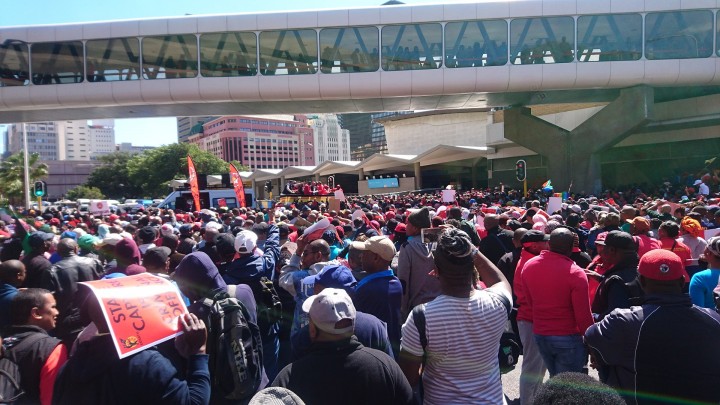 Unresolved issues like the land question can only be solved through class struggle / Image: Discott
Unresolved issues like the land question can only be solved through class struggle / Image: Discott
The oppressed are no longer landless peasants but wage workers living in these urban centres. The return of the productive sectors of the economy now means not only returning the land but all other means of production: the banks, the factories, mines and monopoly industries. In other words, unresolved issues like the land question can only be solved through class struggle and the fight for socialism. In order to solve these problems, what is needed is to nationalise the commanding heights of the economy under the democratic control and management of the working class and introduce a democratically planned socialist economy, which will provide for the need of the many and not the profits of the few.
